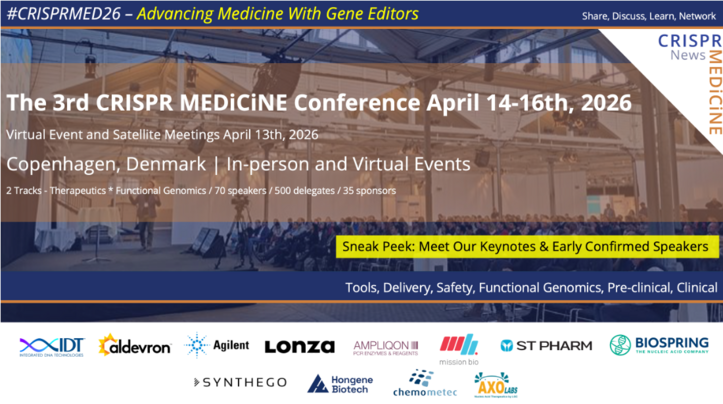Intellia Therapeutics Announces Positive Phase 1 Data From CRISPR Trial in Hereditary Angioedema
Intellia Therapeutics recently announced new positive interim results from the Phase 1 portion of the ongoing Phase 1/2 trial of NTLA-2002 in hereditary angioedema (HAE). The data revealed that, across all patients evaluated at their latest follow-up, a single treatment with NTLA-2002 led to a 95% mean reduction in monthly severe inflammatory attacks seen in HAE patients.
According to Intellia, the latest clinical data reinforces the potential of NTLA-2002 to cure HAE. The company previously presented positive data from the same trial at the American College of Allergy, Asthma & Immunology Annual Scientific Meeting in November 2022, and at the Bradykinin Symposium held in Berlin in September 2022.
NTLA-2002 is an in vivo CRISPR candidate being developed as a single-dose treatment for HAE. The new data, with a cut-off date of February 17th, 2023, was shared in a late-breaking presentation at the recently held European Academy of Allergy and Clinical Immunology Hybrid Congress 2023 in Germany.
NTLA-2002 is designed to continuously prevent severe inflammatory attacks driven by plasma kallikrein protein
HAE is characterised by severe inflammatory attacks with swelling in various organs and tissues. Plasma kallikrein is a protein known to drive multiple inflammatory pathways, including the production of the inflammatory mediator bradykinin, which is overproduced in HAE. Plasma kallikrein inhibition is among the current treatment approaches to HAE.
NTLA-2002 is designed to knock out the target gene kallikrein B1 (KLKB1) in hepatocytes. This gene encodes prekallikrein, a precursor of plasma kallikrein, thus its knockout permanently reduces plasma kallikrein activity and halts the production of bradykinin to prevent HAE attacks.
NTLA-2002 is administered intravenously as a single dose of Cas9 mRNA and gRNA via lipid nanoparticles. Pre-clinical studies demonstrated sustained and therapeutically relevant reduction in plasma kallikrein activity following a single dose in non-human primates.
A single dose of NTLA-2002 eliminated severe inflammatory attacks in HAE patients
In the Phase 1 portion of the NTLA-2002 trial, HAE patients were treated with intravenously-admininstered NTLA-2002 at one of three doses (25 mg, 50 mg, and 75 mg). Following treatment, the occurance of HAE attacks and plasma kallikrein levels were monitored for each patient, with the first analysis of HAE attack rate performed 18 weeks after treatment.
Among the most significant findings from the NTLA-2002 study is that all patients experienced a 95 % mean reduction in monthly HAE attack rate after a single treatment with NTLA-2002. The data shows that the reduction in attack rate was robust across all three dose levels, and durable, with attack-free durations of approx one year or longer for the first three patients dosed in the trial. Furthemore, of all patients dosed with NTLA-2002, those with the most severe symptoms - as measured by number of previous monthly HAE attacks - all became attack-free 16 weeks after treatment and remained attack-free at their latest follow-up, with the longest follow-up on HAE attack rate at 11.5 months post-treatment.
Dose-dependent, robust and long-lasting reductions in plasma kallikrein levels were reported for all patients treated with NTLA-2002 after follow-up periods ranging from 24-48 weeks.
Overall, NTLA-2002 was well tolerated at all dose levels. HAE attacks, plasma kallikrein levels, and safety will be assessed until the end of the study, which is estimated to be completed near the end of 2025.
NTLA-2002 Phase 2 trial ongoing
The U.S. FDA granted Intellia with an orphan drug designation for NTLA-2002 for treating HAE in September 2022. In January 2023, the company was awarded an Innovation Passport by the U.K. Medicines and Healthcare products Regulatory Agency for NTLA-2002 for the treatment of HEA. In March 2023, Intellia announced that the FDA had approved its application to initiate a Phase 2 clinical trial for NTLA-2002 for HEA in the U.S. This move allowed the company to include the U.S. in the Phase 2 portion of the ongoing NTLA-2002 trial.
We will provide further updates on the NTLA-2002 clinical trial as they become available.
For a complete overview of CRISPR IND approvals and ongoing gene-editing clinical trials, check out CRISPR Medicine News' Clinical Trials Database.
To get more CRISPR Medicine News delivered to your inbox, sign up to the free weekly CMN Newsletter here.
Tags
ArticleNewsClinical News UpdatesIn vivoHereditary angioedema, HAECRISPR-CasCas9Intellia Therapeutics, Inc.
CLINICAL TRIALS
Sponsors:
Suzhou Maximum Bio-tech Co., Ltd.
Sponsors:
Zhejiang University







